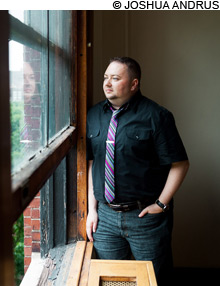
AERIAL VIEW Massachusetts Transgender Political Coalition director Gunner Scott looks ahead. |
I don't know why I'm transgender. I just am.
I do know that I'm not alone. According to the Williams Institute, there are an estimated 33,000 transgender people in Massachusetts, which is almost equivalent to the seats filled at Fenway Park when the Red Sox are on a winning streak. Throughout history, and in every culture, there have been people who have lived as the gender they understood themselves to be and not the sex they were assigned at birth.
Being transgender is not immoral or wrong, but the discrimination transgender people face is fierce. Which is why, on the evening of November 19, 2011, I sat in the gallery of the Massachusetts State House, watching the debate over the Transgender Equal Rights bill. My organization, the Massachusetts Transgender Political Coalition, and a coalition of community groups and activists had worked for six years on its behalf, and that week the law was finally passed. On July 1, it will go into effect, extending non-discrimination protections in employment, housing, credit, and public education to transgender people. This will bring a measure of equality to my life as a transgender man, and especially to the lives of thousands of transgender youth, adults, and families.
It is frustrating to think that, before I transitioned from female to male, I had these rights and protections, but once I came to terms with who I was and began to let the rest of the world in on my reality, these rights and protections I'd grown accustomed to — like being treated fairly when trying to rent an apartment — evaporated.
Passing this law was a huge victory, but it was also bittersweet, because explicit protections for gender identity in public accommodations was not included. Public accommodations are places like grocery stores, restaurants, hospitals, public transit, gas stations, museums, coffee shops, health clubs, parks, and retail stores. Can you imagine being told you're not welcome to shop or dine somewhere because of who you are? This is the cold reality for many transgender youth and adults.
Compared to the time it takes for state laws to change, Barack Obama and his administration have been moving at lightning speed on the federal level with enactments of positive policy changes. Before Obama even stepped foot in the Oval Office, a sexual orientation and gender identity non-discrimination employment policy for his administration was put in place, thus putting out the welcome mat to prospective LGBT applicants. He is the first sitting president to ever to do this, and he has since become the first sitting president to support same-sex marriage.
In the past three and half years, his administration has appointed two talented, openly transgender people, added sexual-orientation and gender-identity non-discrimination provisions for federal employees and HUD-funded housing programs, and issued new rules for passport gender marker changes; and the Office of Personnel Management issued guidance on transgender individuals in the federal workplace. Just this week, the Justice Department issued LGBT-inclusive rules to prevent sexual assault in prisons.
There have been some other recent successes for the transgender community, like the Girl Scouts' decision to include transgender girls, and the rule change at the Miss Universe pageant, which enabled the first transgender woman to compete.